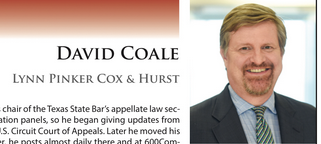An excellent recent article in Law360 summarizes the state of the sometimes-Byzantine structure of Texas’s intermediate appellate courts. The article is behind Law360’s paywall but my remarks are below:
An excellent recent article in Law360 summarizes the state of the sometimes-Byzantine structure of Texas’s intermediate appellate courts. The article is behind Law360’s paywall but my remarks are below:
 The Fifth Circuit affirmed a preliminary injunction that enforced a (reformed) noncompetition agreement under Louisiana law, observing, inter alia:
The Fifth Circuit affirmed a preliminary injunction that enforced a (reformed) noncompetition agreement under Louisiana law, observing, inter alia:
Brock Services LLC v. Rogillio, 936 F.3d 290 (5th Cir. 2019).
 In a case about whether a debtor’s discharge order could be enforced in a district other than the one that entered the order – a difficult question generating much analysis over the years – the Fifth Circuit “adopt[s] the language of the Second Circuit that returning to the issuing bankruptcy court to enforce an injunction is required at least in order to up hold ‘respect for judicial process.’ The bankruptcy court erred in holding that it could address contempt for violations of injunctions arising from discharges by bankruptcy courts in other districts. Therefore, as to . . . those debtors whose discharges were entered by courts in other districts, the bankruptcy court in these proceedings has no authority to enforce the resulting injunction.” Crocker v. Navient Solutions LLC, No. 18-20254 (Oct. 21, 2019) (citation omitted). This holding was fatal to an effort to bring a class action about the alleged mishandling of a type of student-loan debt.
In a case about whether a debtor’s discharge order could be enforced in a district other than the one that entered the order – a difficult question generating much analysis over the years – the Fifth Circuit “adopt[s] the language of the Second Circuit that returning to the issuing bankruptcy court to enforce an injunction is required at least in order to up hold ‘respect for judicial process.’ The bankruptcy court erred in holding that it could address contempt for violations of injunctions arising from discharges by bankruptcy courts in other districts. Therefore, as to . . . those debtors whose discharges were entered by courts in other districts, the bankruptcy court in these proceedings has no authority to enforce the resulting injunction.” Crocker v. Navient Solutions LLC, No. 18-20254 (Oct. 21, 2019) (citation omitted). This holding was fatal to an effort to bring a class action about the alleged mishandling of a type of student-loan debt.
 David Russell paid money to Ellen Yarrell, and by doing so argued that he discharged a debt to his ex-wife Janna Russell. The Fifth Circuit agreed with the district court that this payment was ineffective because Yarrell was not Janna’s agent at the time,
David Russell paid money to Ellen Yarrell, and by doing so argued that he discharged a debt to his ex-wife Janna Russell. The Fifth Circuit agreed with the district court that this payment was ineffective because Yarrell was not Janna’s agent at the time,
As to express agency, the relevant court order required that any negotiable instrument “shall be made payable to ‘Janna Russell’ only and shall not have any other endorsement.” As to apparent agency, while Yarrell was still an attorney of record for Janna at the time, that general relationship did not control over David’s specific awareness that Yarrell was not authorized to serve as Janna’s agent on this specific issue. Russell v. Russell, No. 18-20643 (Oct. 21, 2019).
Practice tip: The Court noted the black-letter principles that “whether . . . authority exists ‘depends  on some communication by the principal either to the agent (actual or express authority) or to the third party (apparent or implied authority).’ It does not depend on whether the principal benefits from the transaction.“ (citation omitted, emphasis added). The Court noted, though, that neither party had raised the issue of ratification. Principles of restitution could also potentially come into play depending on the relationship between the alleged principal and agent.
on some communication by the principal either to the agent (actual or express authority) or to the third party (apparent or implied authority).’ It does not depend on whether the principal benefits from the transaction.“ (citation omitted, emphasis added). The Court noted, though, that neither party had raised the issue of ratification. Principles of restitution could also potentially come into play depending on the relationship between the alleged principal and agent.
 “This case is a perfect example of when we should certify cases, and why certification is valuable. We are presented with a question of pure statutory interpretation on a recurring issue of interest to citizens and businesses across Texas. What’s more, it is a question that divided judges on this court. As reflected in our competing concurring opinions, different judges on this court have disagreed about whether the district court correctly interpreted the Texas Sales Representative Act (“TSRA”). But we all agreed that reasonable minds could differ. So rather than provide a partial answer—binding only litigants who file in federal court, not those in state court— we instead certified the question to the Supreme Court of Texas, which can speak with authority for all litigants, in state and federal court alike. We now have that answer, and accordingly affirm in part and reverse and remand in part.” JCB Inc. v. Horsburgh & Scott Co., No. 17-51023 (Oct. 17, 2019).
“This case is a perfect example of when we should certify cases, and why certification is valuable. We are presented with a question of pure statutory interpretation on a recurring issue of interest to citizens and businesses across Texas. What’s more, it is a question that divided judges on this court. As reflected in our competing concurring opinions, different judges on this court have disagreed about whether the district court correctly interpreted the Texas Sales Representative Act (“TSRA”). But we all agreed that reasonable minds could differ. So rather than provide a partial answer—binding only litigants who file in federal court, not those in state court— we instead certified the question to the Supreme Court of Texas, which can speak with authority for all litigants, in state and federal court alike. We now have that answer, and accordingly affirm in part and reverse and remand in part.” JCB Inc. v. Horsburgh & Scott Co., No. 17-51023 (Oct. 17, 2019).
 The Fifth Circuit will not ordinarily grant a writ of mandamus about the erroneous denial of a motion to dismiss for lack of subject matter jurisdiction. But in In re Gee, a sweeping challenge to Louisiana’s abortion laws, the Court observed:
The Fifth Circuit will not ordinarily grant a writ of mandamus about the erroneous denial of a motion to dismiss for lack of subject matter jurisdiction. But in In re Gee, a sweeping challenge to Louisiana’s abortion laws, the Court observed:
“Here, the combination of five federalism concerns makes this a special circumstance and distinguishes it from an ordinary case: (1) A sovereign State is requesting the writ; (2) Plaintiffs seek sweeping review of an entire body of state law; (3) Plaintiffs seek structural injunctions that would give the district court de facto control of state law; (4) the type of discovery waiting on the other side of Louisiana’s motion to dismiss is categorically different than what awaits an ordinary civil litigant; and (5) the ordinary civil litigant cannot demand attorneys’ fees from the State’s taxpayers.”
The Court declined to grant the writ at this stage and after its detailed analysis of the relevant issues, observing
“. . . two reasons. First, it’s not clear from the district court’s order how it would resolve the State’s jurisdictional challenge. And second, much of the State’s argument in its mandamus petition goes beyond jurisdiction. In particular, the State argues that Plaintiffs’ “cumulative-effects challenge” is not cognizable. But that challenge might change after the district court conducts its claim-by-claim analysis of Plaintiffs’ standing. So in our view, resolution of whether that challenge is cognizable should await the district court’s jurisdictional analysis.”
No. 19-30353 (Oct. 18, 2019).
 The Cenacs sued Orkin after Formosan termites damaged their house. Based largely on the contract documents, the Fifth Circuit affirmed summary judgment for Orkin, with the exception of the Cenacs’ negligence claim:
The Cenacs sued Orkin after Formosan termites damaged their house. Based largely on the contract documents, the Fifth Circuit affirmed summary judgment for Orkin, with the exception of the Cenacs’ negligence claim:
None of the contracts between the Cenacs and Orkin—the 1991 Agreement, the CPP, or the SSA—required Orkin to recommend, instruct, or direct its customers on how to remedy conditions conducive to termite infestation. . . . Under these circumstances, the Cenacs’ claim that Orkin recommended installation of a vapor barrier and approved its allegedly negligent installation does not involve the breach of a specific contractual duty. Rather, Orkin undertook the task of recommending and directing installation of a vapor barrier, which . . . it had no obligation to do under its contracts with the Cenacs.
Cenac v. Orkin LLC, No. 18-31121 (Oct. 18, 2019).
 The EPA approved Louisiana’s plan for controlling haze; both environmental and industry groups protested. The Fifth Circuit affirmed the EPA’s approval under the “arbitrary and capricious” standard of review.
The EPA approved Louisiana’s plan for controlling haze; both environmental and industry groups protested. The Fifth Circuit affirmed the EPA’s approval under the “arbitrary and capricious” standard of review.
As to industry: “We afford ‘significant deference’ to agency decisions involving analysis of scientific data within the agency’s technical expertise. The EPA’s selection of a model to measure air pollution levels is precisely that type of decision. The EPA therefore did not act arbitrarily and capriciously in relying on the CALPUFF model to approve Louisiana’s [statutorily-required] determinations.”
As to environmental groups: “Louisiana’s explanation of its . . . determination . . . omitted two of the five mandatory factors and failed to compare—or even set out—the numbers for the costs and benefits of the control options Louisiana considered. Louisiana also failed to explain how its decision accounted for the EPA-submitted analyses that pointed out substantial flaws in other analyses in the administrative record. But applying the deferential standards of the Administrative Procedures Act to the facts of this case, we hold that the EPA’s approval of Louisiana’s [plan] was not arbitrary and capricious.” Sierra Club v. EPA, No. 18-60116 (Oct. 3, 2019).
 Walker and Ameriprise Financial, pursuant to their agreement, arbitrated their dispute under FINRA rules. Walker argued that the panel “exceeded its powers,” and thus fell within a statutory ground for vacatur of the arbitration award. The Fifth Circuit disagreed: “’An arbitrator exceeds his powers [under § 10(a)(4)] if he acts contrary to express contractual provisions.’ Walker does not argue that the panel violated any express provisions of the arbitration agreement, but only that it incorrectly applied [FINRA] Rule 13504.” Walker v. Ameriprise Fin. Servcs., Inc., No. 18-11641 (Oct. 9, 2019) (unpublished).
Walker and Ameriprise Financial, pursuant to their agreement, arbitrated their dispute under FINRA rules. Walker argued that the panel “exceeded its powers,” and thus fell within a statutory ground for vacatur of the arbitration award. The Fifth Circuit disagreed: “’An arbitrator exceeds his powers [under § 10(a)(4)] if he acts contrary to express contractual provisions.’ Walker does not argue that the panel violated any express provisions of the arbitration agreement, but only that it incorrectly applied [FINRA] Rule 13504.” Walker v. Ameriprise Fin. Servcs., Inc., No. 18-11641 (Oct. 9, 2019) (unpublished).
 After an unsuccessful detour to the High Court of the Republic of the Marshall Islands, a plaintiff tried to appeal an award from the Western District of Texas of $26,726 in costs under Fed. R. Civ. P. 41(d) (“Costs of a Previously Dismissed Action”), along with a related order that administratively closed the Texas matter until the costs were paid. The Fifth Circuit found it had no jurisdiction because: (1) administrative closure is not a final judgment; (2) the collateral-order doctrine did not apply, “[s]ince there is no indication that the ordered costs could not be paid and later recovered upon a successful appeal of a final judgment,” and (3) mandamus was not available, especially when: “[A]ppellants here do not allege that they are unable to pay. Unwillingness to pay based on disagreement with the district court’s decision is insufficient. Appellants can obtain relief through direct appeal after a final judgment.” Sammons v. Economou, No. 18-50932 (Oct. 10, 2019).
After an unsuccessful detour to the High Court of the Republic of the Marshall Islands, a plaintiff tried to appeal an award from the Western District of Texas of $26,726 in costs under Fed. R. Civ. P. 41(d) (“Costs of a Previously Dismissed Action”), along with a related order that administratively closed the Texas matter until the costs were paid. The Fifth Circuit found it had no jurisdiction because: (1) administrative closure is not a final judgment; (2) the collateral-order doctrine did not apply, “[s]ince there is no indication that the ordered costs could not be paid and later recovered upon a successful appeal of a final judgment,” and (3) mandamus was not available, especially when: “[A]ppellants here do not allege that they are unable to pay. Unwillingness to pay based on disagreement with the district court’s decision is insufficient. Appellants can obtain relief through direct appeal after a final judgment.” Sammons v. Economou, No. 18-50932 (Oct. 10, 2019).
 A substantial body of law, focused on the requirements of the Federal Rules of Civil Procedure, defines the appropriate level of specificity for a plaintiff’s complaint. Pleading specificity can interact with other bodies of law as well, such as insurance coverage, where additional detail can affect an “eight-corners” analysis of whether the allegations fall within coverage. Another illustrative, if infrequent, situation appeared in the FCA case of United States ex rel. Hendrickson v. Bank of America, N.A., where a plaintiff’s lack of detail fed into the defendants’ defense of public disclosure: “Not disputing that the six documents constituted public disclosures, Hendrickson claims they do not disclose substantially the same allegations as his complaint because they do not reference DNEs or name specific banks. The banks respond that the documents’ disclosures are as specific as the complaint, which fails to allege particular instances of their receiving DNEs or differentiate allegations made against each defendant.” No. 18-11472 (Oct. 7, 2019).
A substantial body of law, focused on the requirements of the Federal Rules of Civil Procedure, defines the appropriate level of specificity for a plaintiff’s complaint. Pleading specificity can interact with other bodies of law as well, such as insurance coverage, where additional detail can affect an “eight-corners” analysis of whether the allegations fall within coverage. Another illustrative, if infrequent, situation appeared in the FCA case of United States ex rel. Hendrickson v. Bank of America, N.A., where a plaintiff’s lack of detail fed into the defendants’ defense of public disclosure: “Not disputing that the six documents constituted public disclosures, Hendrickson claims they do not disclose substantially the same allegations as his complaint because they do not reference DNEs or name specific banks. The banks respond that the documents’ disclosures are as specific as the complaint, which fails to allege particular instances of their receiving DNEs or differentiate allegations made against each defendant.” No. 18-11472 (Oct. 7, 2019).
 A party sought to appeal a ruling in a forfeiture action about the M/V Galactica Star (distinct from the Battlestar Galactica, right); the Fifth Circuit dismissed for lack of jurisdiction: “Although a “Final Judgment” was signed and entered in district court, it did not reference Rule 54(b), did not include any language taken from the rule,and did not express the sentiments contained within the rule. The only document referenced in the judgment was the Government’s motion to strike, which did
A party sought to appeal a ruling in a forfeiture action about the M/V Galactica Star (distinct from the Battlestar Galactica, right); the Fifth Circuit dismissed for lack of jurisdiction: “Although a “Final Judgment” was signed and entered in district court, it did not reference Rule 54(b), did not include any language taken from the rule,and did not express the sentiments contained within the rule. The only document referenced in the judgment was the Government’s motion to strike, which did  not mention Rule 54(b), the language of the rule, partial finality, or immediate appealability.” United States v. The MV Galactica Star, No. 18-20781 (Oct. 1, 2019). Cf. Lehmann v. Har-Con Corp., 39 S.W.3d 191 (Tex. 2001) (“[W]hen there has not been a conventional trial on the merits, an order or judgment is not final for purposes of appeal unless it actually disposes of every pending claim and party or unless it clearly and unequivocally states that it finally disposes of all claims and all parties.” (emphasis added)).
not mention Rule 54(b), the language of the rule, partial finality, or immediate appealability.” United States v. The MV Galactica Star, No. 18-20781 (Oct. 1, 2019). Cf. Lehmann v. Har-Con Corp., 39 S.W.3d 191 (Tex. 2001) (“[W]hen there has not been a conventional trial on the merits, an order or judgment is not final for purposes of appeal unless it actually disposes of every pending claim and party or unless it clearly and unequivocally states that it finally disposes of all claims and all parties.” (emphasis added)).
 While focused on the intricate McDonnell-Douglas burden-shifting framework (a structure described in more than one Fifth Circuit opinion as “kudzu-like“), Garcia v. Professional Contract Servcs. Inc provides general insight about creation of a genuine issue of material fact.
While focused on the intricate McDonnell-Douglas burden-shifting framework (a structure described in more than one Fifth Circuit opinion as “kudzu-like“), Garcia v. Professional Contract Servcs. Inc provides general insight about creation of a genuine issue of material fact.
As to the plaintiff’s prima facie case, all parties agreed that “proximity in time” – the passage of only 76 days between the plaintiff’s protected whistleblowing activity and termination – was sufficient to meet this burden.
As to pretext, while temporal proximity alone is not enough, the Fifth Circuit found a genuine issue of fact when the plaintiff pointed to: “(1) temporal proximity between his protected activity and his firing; (2) his dispute of the facts leading up to his termination; (3) a similarly situated employee who was not terminated for similar conduct; (4) harassment from his supervisor after the company knew of his protected whistleblowing conduct; (5) the ultimate stated reason for the company’s termination of [plaintiff] had been known to the compan y for years; and (6) the company stood to lose millions of dollars if its conduct was discovered.” The Court also disagreed with the district court about whether the “similarly situated” employee identified by the plaintiff qualified as such, noting that while they worked in different divisions: “Rodas and Garcia had identical jobs, reported to the same people, had a similar history of infractions, and both made mistakes overseeing Job 560.” No. 18-50144 (Sept. 11, 2019).
y for years; and (6) the company stood to lose millions of dollars if its conduct was discovered.” The Court also disagreed with the district court about whether the “similarly situated” employee identified by the plaintiff qualified as such, noting that while they worked in different divisions: “Rodas and Garcia had identical jobs, reported to the same people, had a similar history of infractions, and both made mistakes overseeing Job 560.” No. 18-50144 (Sept. 11, 2019).
 Are unpublished opinions introducing murkiness into a legal issue? Rein them in with Garcia v. Professional Contract Servcs., Inc., No. 18-50144, (Sept. 11, 2019), which:
Are unpublished opinions introducing murkiness into a legal issue? Rein them in with Garcia v. Professional Contract Servcs., Inc., No. 18-50144, (Sept. 11, 2019), which:
 the binding Fifth Circuit precedent on this point because they did not need to: both decisions resolved the cases before them on other grounds.” (citations omitted); and
the binding Fifth Circuit precedent on this point because they did not need to: both decisions resolved the cases before them on other grounds.” (citations omitted); and 600Camp and 600Commerce are recognized in the first-ever list of “Texas Trailblazers,” as just published by Texas Lawyer!
600Camp and 600Commerce are recognized in the first-ever list of “Texas Trailblazers,” as just published by Texas Lawyer!
 If you are litigating a Texas contract-law case and feel the need to scratch an equitable itch – don’t: “The Supreme Court of Texas has observed that the interpretive role of judges ‘is to be neither generous nor parsimonious’ but unswervingly faithful to what the words actually say. Looser atextual readings may scratch an equitable itch, or at times seem more pragmatic. But the Texas High Court adheres to this centuries-old principle—’law, without equity, though hard and disagreeable, is much more desirable for the public good, than equity without law: which would make every judge a legislator, and introduce the most infinite confusion.’ Texas precedent is no-nonsense about giving words their most forthright, contextual meaning. Plain language forbids judicial ad-libbing. Here, the text is clear. And, at least in Texas, clear text = controlling text.” Weaver v. Metropolitan Life Ins. Co., No. 18-10517 (Sept. 20, 2019).
If you are litigating a Texas contract-law case and feel the need to scratch an equitable itch – don’t: “The Supreme Court of Texas has observed that the interpretive role of judges ‘is to be neither generous nor parsimonious’ but unswervingly faithful to what the words actually say. Looser atextual readings may scratch an equitable itch, or at times seem more pragmatic. But the Texas High Court adheres to this centuries-old principle—’law, without equity, though hard and disagreeable, is much more desirable for the public good, than equity without law: which would make every judge a legislator, and introduce the most infinite confusion.’ Texas precedent is no-nonsense about giving words their most forthright, contextual meaning. Plain language forbids judicial ad-libbing. Here, the text is clear. And, at least in Texas, clear text = controlling text.” Weaver v. Metropolitan Life Ins. Co., No. 18-10517 (Sept. 20, 2019).